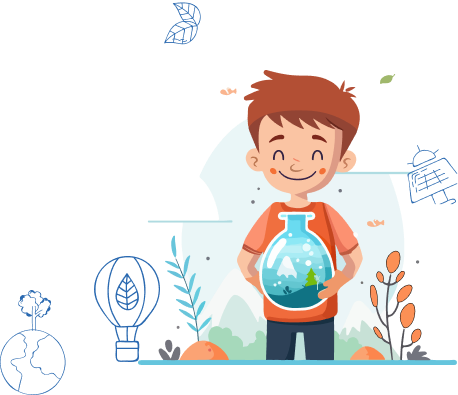Water – A Precious Gift – A Complete Guide For Class 3 EVS Chapter 7
Welcome to iPrep, your Learning Super App. Our learning resources for Chapter 7, “Water – A Precious Gift,” in Class 3 EVS are meticulously designed to ensure students gain a comprehensive understanding of this essential topic. These resources include detailed notes, interactive exercises, and practical examples that cover the entire spectrum of key concepts. From fundamental principles of water conservation, sources of water, and its uses, to understanding the water cycle, these materials emphasize the importance of preserving water. Through engaging activities, students learn sustainable practices and appreciate water as a vital resource for all life on Earth.
The concept of “Water – A Precious Gift” in Class 3 EVS delves into the foundational principles of life by exploring the essential characteristics that define the significance of water. It emphasizes how water supports all living beings and ecosystems, highlighting its role in maintaining balance in nature. The chapter also examines the various sources of water, the importance of its conservation, and sustainable usage. Through interactive lessons, students gain an understanding of the water cycle and learn responsible practices to preserve this vital resource for future generations.
The Mystery of Rain
Rain is something we often look forward to or wonder about. Have you ever tried to predict if it will rain by looking at the sky?

Clues to Predict Rain
Ask an elder how they guess whether it will rain, then observe the sky and list your clues.
I think it will rain today because:
I think it will not rain today because:
Observing the Rain
When it does rain, pay attention to how it falls. Is it light or heavy? Do the raindrops come down quickly or slowly? Watch the direction of the rain—is it straight or slanting? Collect some rainwater in a vessel and examine it. Draw a picture of what you see.
What Happens After the Rain?
When rainwater hits the ground, it can go in different directions. It may:
- Get absorbed by the soil
- Collect in puddles
- Flow away to streams or rivers
Eventually, some water makes its way into the soil and becomes part of underground water systems, which supply wells.
Reflect and Discuss
- Do you think it will rain again soon?
- Where does the rainwater go after it falls?
Local Water Bodies
Do you have a stream, river, or pond near your home? If so, take some time to visit it and observe the surroundings. Notice the plants growing near the water, the birds or animals that may come to drink, and the movement of the water itself. Once you’ve seen everything, draw what you observe—whether it’s the flowing river, a calm pond, or the life it supports. You can also share your experience with your class by singing a song or reciting a poem about rivers and their importance to nature and our lives.

Water – A Gift We Must Protect
Water reaches our homes in many ways—via taps, tanks, or sometimes by people who carry it from wells or rivers. It’s essential to know where our water comes from and to thank those who make sure we have access to it.
How Water Reaches Us
Surya and Barkha are curious about how water reaches the taps in their home. They trace the pipes to find a tank on the roof, but how did the water get there? Understanding the journey of water from its source to our homes helps us appreciate its value.
Where Do You Get Your Water From?
Here are some ways water may come to your home:
Source of Water How Water is Collected Well Water is drawn using a pulley or hand pump Tap Water comes from pipes connected to a tank Tanker Water delivered from a tanker
Water in Daily Life
We use water for many daily activities. Take a moment to think about how much water you use. For example:
- How many mugs of water do you need to brush your teeth?
- How much water do you use to shower?
What Happens if Water Runs Out?
Surya and Barkha had a day without water. How did they cope? Storing water becomes very important, especially when it is not always available.
Storing Water
In the past, people used various vessels to store water, such as clay pots, brass containers, or glass bottles. Today, we have modern containers like plastic buckets. You can ask your elders about the different water storage methods they use.

Exhibition Time!
Draw pictures of different water vessels and display them in your classroom. This will help you understand how water storage has evolved.
Save Every Drop!
Water is vital, and we should be careful not to waste it. Discuss with your family ways to reduce water waste, and come up with solutions for conserving water at home.
Reusing Water
After we use water, it becomes dirty. Instead of wasting it, think of ways to reuse it, like watering plants or cleaning. Avoid using too much soap or chemicals that can contaminate the water further.

Offering Water to Others
In many cultures, offering water to guests is a sign of hospitality. In hot regions, people often leave pots of water outside their homes for passersby to drink.
You can take action by:
- Offering clean drinking water to anyone who comes to your door
- Setting up a birdbath to provide water for birds during hot summer months
Conclusion
In conclusion, CBSE Class 3 EVS Chapter 7, “Water – A Precious Gift,” is an essential chapter that teaches young learners the significance of water in our daily lives. Through this chapter, students understand the importance of conserving water, how it reaches our homes, and the different ways it supports all living beings. The activities and lessons provided help children appreciate water as a limited and valuable resource that must be protected.
By studying “Water – A Precious Gift,” students in Class 3 EVS not only learn about the water cycle and sources of water but also develop responsible habits to ensure its sustainable use. Let’s all work together to protect this precious gift—water—for future generations, as emphasized throughout CBSE Class 3 EVS Chapter 7: “Water – A Precious Gift.”
Practice questions on Chapter 7 - Water - A Precious Gift
Get your free Chapter 7 - Water - A Precious Gift practice quiz of 20+ questions & detailed solutions
Practice Now








